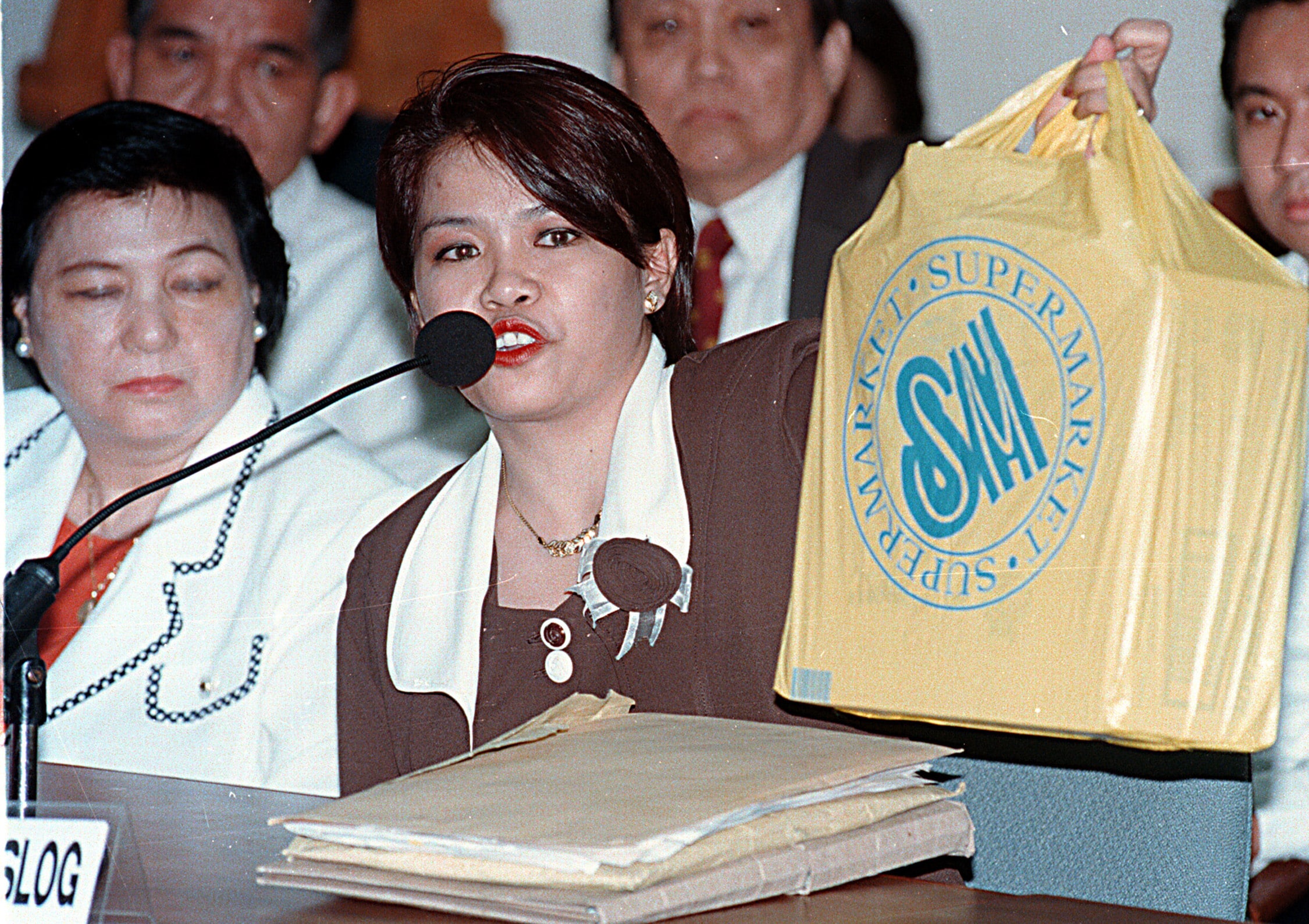
BAGWOMAN Mary Ann Maslog, photographed here on March 9, 1999, appears before a congressional hearing where she shows the plastic bag of mugs supposedly intended as gifts for Malacañang officials. Unfortunately, Maslog claims, she brought the wrong bag to the Palace—one containing P3 million in cash. —Inquirer file photo
MANILA, Philippines — She escaped possible conviction for graft in the 1998 textbook scam case after the Sandiganbayan was informed of her “death” in 2019.
But last week, agents of the National Bureau of Investigation (NBI) discovered that Mary Ann Maslog was alive and well, as they arrested her for yet another alleged racket.
Maslog, who gained notoriety for allegedly bringing a box containing P3 million in bribes to Malacañang in 1999, was captured in Quezon City on Sept. 25, five years after purportedly faking her own death.
READ: Sandiganbayan affirms conviction of ex-DepEd execs over textbook scam
According to the NBI, two persons complained that she had defrauded them of around P8 million in an investment scheme, where she used a different identity.
Using the alias “Dr. Jesica Francisco,” Maslog introduced herself as a supplier of water systems and medical supplies in the Bangsamoro Autonomous Region in Muslim Mindanao (BARMM), the complainants told the NBI.
One of them said Maslog befriended her in September 2021 before enticing her to invest P5 million in a BARMM project, promising a guaranteed return of P65 million.
Forged check
After over a year, Maslog gave the complainant a manager’s check amounting to more than P58 million as her share.
The check turned out to be a forgery.
After the alleged scammer’s arrest, the NBI found that her fingerprint taken from a biometric printout from the Bureau of Immigration matched with the one in Maslog’s NBI clearance in 2016.
Further verification with the courts revealed that Maslog, also known as Mary Ann Evans Smith and Mary Ann Tupa Maslog-Smith, was the subject of two outstanding warrants of arrest in the Makati and Parañaque regional trial courts.
At a press briefing on Tuesday, NBI Director Jaime Santiago said the agency had already reported Maslog’s circumstances to the Sandiganbayan, prompting the court to issue a bench warrant for her arrest.
No bail was recommended for her conditional liberty, the official said, adding that Maslog would remain in NBI custody while awaiting orders from the court.
Santiago added that the bureau had filed charges of 29 counts of falsification of public documents, and violation of the anti-alias law against Maslog in the Quezon City prosecutor’s office. This is in addition to estafa and bribery charges against her, he said.
In 1998, Maslog, who represented a textbook publishing company called Esteem Enterprises, was implicated in a P24-million graft case involving officials of the education department, then called the Department of Education, Culture and Sports (DECS).
Reported dead
In a decision handed down on Oct. 16, 2020, the Sandiganbayan found two former DECS officials, Emilia Aranas and Ernesto Guiang, guilty of graft and sentenced them to a maximum prison term of 10 years.
But Maslog was not included in the decision as the case against her was archived after her lawyer reported to the court on Nov. 27, 2019, that she died on Nov. 18 that same year.
Court records showed that Aranas was the former chief accountant and Guiang, the former chief of the budget and finance division, of DECS Regional Office 8. Together with Maslog, the three were accused of “willfully, unlawfully, and criminally” faking documents to secure payments from the Department of Budget and Management (DBM) for books and supplementary materials supplied by Esteem Enterprises.
Ranking officials
On Jan. 19, 1999, she was reported to have brought a box to Malacañang containing a bribe of P3 million, which was received by a DBM employee named Celeste Payot.
According to reports, Esteem Enterprises, which was owned by Mario Barria, was seeking a special allotment release order from the DBM for its P200-million contract with DECS.
The bribery attempt was allegedly meant to speed up the release of the money as part of a bigger P400-million deal for the purchase of books to be delivered to high schools around the country.
In February of that year, the NBI filed criminal charges against Maslog for the bribery attempt.
The case involved ranking officials at the time, such as then-budget Secretary Benjamin Diokno, Deputy Executive Secretary Vicente de la Serna and his consultant, Ricardo Fulgencio, as well as then-President Joseph Estrada’s cousin Cecilia Ejercito Castro.
But two Senate committees that investigated the case in 2000 cleared the officials of liability.
Esteem Enterprises also figured in a graft and malversation case against former Gov. Nur Misuari of the BARMM’s precursor, the Autonomous Region in Muslim Mindanao, in September 2016.
The Moro National Liberation Front founder was indicted after the Commission on Audit found that he approved payment to five suppliers without undergoing public bidding, including Esteem Enterprises, which reportedly received more than P12 million for the contract.